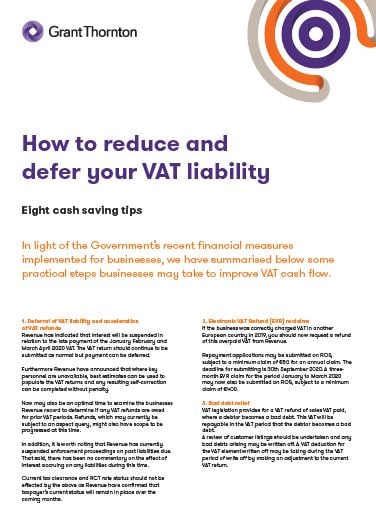-
Aviation Advisory
Our dedicated Aviation Advisory team bring best-in-class expertise across modelling, lease management, financial accounting and transaction execution as well as technical services completed by certified engineers.
-
Consulting
Our Consulting team guarantees quick turnarounds, lower partner-to-staff ratio than most and superior results delivered on a range of services.
-
Business Risk Services
Our Business Risk Services team deliver practical and pragmatic solutions that support clients in growing and protecting the inherent value of their businesses.
-
Deal Advisory
Our experienced Deal Advisory team has provided a range of transaction, valuation, deal advisory and restructuring services to clients for the past two decades.
-
Forensic Accounting
Our Forensic and Investigation Services team have targeted solutions to solve difficult challenges - making the difference between finding the truth or being left in the dark.
-
Financial Accounting and Advisory
Our FAAS team designs and implements creative solutions for organisations expanding into new markets or undertaking functional financial transformations.
-
Restructuring
Grant Thornton is Ireland’s leading provider of insolvency and corporate recovery solutions.
-
Risk Advisory
Our Risk Advisory team delivers innovative solutions and strategic insights for the Financial Services sector, addressing disruptive forces, regulatory changes, and emerging trends to enhance risk management and foster competitive advantage.
-
Sustainability Advisory
Our Sustainability Advisory team works with clients to accelerate their sustainability journey through innovative and pragmatic solutions.

-
 Asset management Asset management of the futureIn today’s global asset management landscape, there is an almost constant onslaught of change and complexity. To combat such complex change, asset managers need a consolidated approach. Read our publication and find out more about what you can achieve by choosing to work with us.
Asset management Asset management of the futureIn today’s global asset management landscape, there is an almost constant onslaught of change and complexity. To combat such complex change, asset managers need a consolidated approach. Read our publication and find out more about what you can achieve by choosing to work with us. -
 Internal Audit Maintaining Compliance with New EU Pension Directive IORP IIOn 28 April 2021, the Irish Government transposed IORP II (Institution for Occupational Retirement Provision), an EU directive on the activities and supervision of pension schemes, into law.
Internal Audit Maintaining Compliance with New EU Pension Directive IORP IIOn 28 April 2021, the Irish Government transposed IORP II (Institution for Occupational Retirement Provision), an EU directive on the activities and supervision of pension schemes, into law. -
 Risk, Compliance and Professional Standards FRED 82 – Periodic Updates to FRS 100 – 105The concept of a new suite of standards for the UK and Ireland, aligning with international financial reporting standards, was first conceived in 2002
Risk, Compliance and Professional Standards FRED 82 – Periodic Updates to FRS 100 – 105The concept of a new suite of standards for the UK and Ireland, aligning with international financial reporting standards, was first conceived in 2002 -
 Audit and Assurance Auditor transition: how to achieve a smooth changeoverAppointing new auditors may seem like a daunting task that will be disruptive to your business and a drain on the finance function. Nevertheless, there are a multitude of reasons to consider a change, including simply seeking a ‘fresh look’ at the business.
Audit and Assurance Auditor transition: how to achieve a smooth changeoverAppointing new auditors may seem like a daunting task that will be disruptive to your business and a drain on the finance function. Nevertheless, there are a multitude of reasons to consider a change, including simply seeking a ‘fresh look’ at the business.
-
Corporate Tax
Our Corporate Tax team is made up of more than 40 highly experienced senior partners and directors who work directly with a wide range of domestic and international clients; covering Corporation Tax, Company Secretarial, Employer Solutions, Global Mobility and Tax Incentives.
-
Financial Services Tax
The Grant Thornton team is made up of experts who are fully up to date in terms of changing and evolving tax legislation. This is combined with industry expertise and an in-depth knowledge of the evolving financial services regulatory landscape.
-
International Tax
We develop close relationships with clients in order to gain a deep understanding of their businesses to ensure they make the right operational decisions. The wrong decision on how a company sells into a new market or establishes a new subsidiary can have major tax implications.
-
Private Client
Grant Thornton’s Private Client Services team can advise you on all areas of financial, pension, investment, succession and inheritance planning. We understand that each individual’s circumstances are different to the next and we tailor our services to suit your specific needs.
-
VAT
Grant Thornton’s team of indirect tax specialists helps a range of clients across a variety of sectors including pharmaceuticals, financial services, construction and property and food to navigate these complexities.

In light of the Government’s recent financial measures implemented for businesses, we have summarised below some practical steps businesses may take to improve VAT cash flow.
1. Deferral of VAT liability and acceleration of VAT refunds
Revenue has indicated that interest will be suspended in relation to the late payment of the January February and March April 2020 VAT. The VAT return should continue to be submitted as normal but payment can be deferred.
Furthermore Revenue have announced that where key personnel are unavailable, best estimates can be used to populate the VAT returns and any resulting self-correction can be completed without penalty.
Now may also be an optimal time to examine the businesses Revenue record to determine if any VAT refunds are owed for prior VAT periods. Refunds, which may currently be subject to an aspect query, might also have scope to be progressed at this time.
In addition, it is worth noting that Revenue has currently suspended enforcement proceedings on past liabilities due. That said, there has been no commentary on the effect of interest accruing on any liabilities during this time.
Current tax clearance and RCT rate status should not be effected by the above as Revenue have confirmed that taxpayer’s current status will remain in place over the coming months.
2. Electronic VAT Refund (EVR) reclaims
If the business was correctly charged VAT in another European country in 2019, you should now request a refund of this overpaid VAT from Revenue.
Repayment applications may be submitted on ROS, subject to a minimum claim of €50 for an annual claim. The deadline for submitting is 30th September 2020. A three-month EVR claim for the period January to March 2020 may now also be submitted on ROS, subject to a minimum claim of €400.
3. Bad debt relief
VAT legislation provides for a VAT refund of sales VAT paid, where a debtor becomes a bad debt. This VAT will be repayable in the VAT period that the debtor becomes a bad debt.
A review of customer listings should be undertaken and any bad debts arising may be written off. A VAT deduction for the VAT element written off may be taking during the VAT period of write off by making an adjustment to the current VAT return.
4. Annual VAT recovery adjustment
Where a business is engaged in a mix of VAT taxable and VAT exempt activities, then a VAT adjustment should be submitted to Revenue within a specified period following the accounting year end. If there has been an under or over estimation of VAT recovery, a VAT adjustment should made to Revenue.
For example a business who submits bi-monthly VAT returns with a 31 December accounting year-end can now examine the VAT recovery methodology used and any VAT adjustments due should be submitted to Revenue by 23 July 2020, i.e. the filing date for the May-June 2020 VAT return.
5. Basis of accounting for VAT
Ensure the business is accounting for VAT on a cash receipts basis once certain conditions are satisfied. Under the cash receipts method of VAT accounting, VAT is due at the point of payment by your customer.
Under general VAT accounting rules VAT becomes due on issuance of a VAT invoice even where the invoice remains unpaid. The cash receipts basis may be used where either; 90% of turnover is derived from sales of goods or supplies of services to persons not registered for VAT or, gross turnover is less than €2million per annum.
If the above conditions are satisfied, Revenue should be contacted to request the change from the invoice basis of accounting for VAT to the cash receipts basis.
6. Change your VAT reporting period
Most VAT registered entities will be on a bi-monthly VAT reporting period. This could be changed to;
- four monthly VAT period (where annual VAT payments are between €3,001 and €14,400),
- six monthly (if VAT payments are less than €3,000 annually) or
- annually (subject to direct debit setup and bi-monthly VAT liabilities of €50,000 or less).
If the above criteria are satisfied, a change may be requested to take effect following the VAT period during which the change is requested. Revenue may look back over a certain period in determining if the request will be allowed.
If a business is in a constant VAT refund position then an application may be made to Revenue to lodge monthly VAT returns as a way of expediting VAT refunds.
7. Section 56 authorisation
VAT reporting entities whose turnover from exports, intra community supplies etc. makes up 75% of their turnover may request a Section56 authorization from Revenue. The benefits of this authorisation is that businesses may receive most VATable supplies at 0% VAT, thus improving cash flow.
A calculation should be done to determine if 75% of turnover derives from the above activities. Authorisation can be requested from Revenue.
8. Charity compensation scheme
Charities are entitled to claim a refund of a proportion of their VAT costs based on the level of non-public funding. The minimum claim which may be submitted is €500 and the scheme operates on a supplier paid basis.
Submissions for this scheme for the year 2019 may now be made on ROS. As there is limited funding available from this scheme it is best to get claims in as early as possible.
How Grant Thornton can help:
If you are unsure how to implement any of the above measures, we can assist and ensure that you get the best possible VAT outcome, at a time when cash is needed.
We can also review any past VAT period you wish with the view to determine if any VAT has been under claimed.












